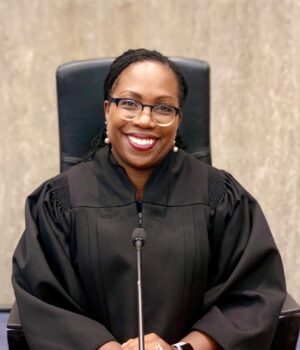by Jack Miller
On Friday, February 25, President Joe Biden announced his nomination of Judge Ketanji Brown Jackson for the Supreme Court. Jackson would be taking the newly vacated position, opened by the retirement of Justice Stephen Breyer, who announced his retirement earlier this year. Jackson’s hearings, which began last week, have been filled with consistent praise along with a barrage of interrogations by various members of Congress. The hearings have been an indication of the trials that the first Black woman on the Supreme Court will have to endure before ascending to her position as one of the nine justices.
Regardless of the state of the hearings, Biden has chosen Jackson on account of her longstanding record of commitment to the judicial system and championing the greater public. Jackson earned her law degree from Harvard in 1996 and went on to hold three different clerkships with federal judges throughout the following years. In 1999, Jackson held a clerkship for Justice Stephen Breyer – who she is now slated to replace.
Jackson has had a long track record of working in the court system, following her initial clerkships she held a position of public defender from 2005 to 2007. Much of her time within the judicial system has been spent in Washington D.C. where she has stridently worked her way up the legal system, joining the District of Columbia Circuit in 2013, where she has remained until her current nomination to the SCOTUS earlier this year.
Justice Ketanji Brown Jackson, if approved, would be the first Black female judge appointed to the Supreme Court, something that the Biden administration had promised from the early days of the campaign. Not only would Jackson be the first Black female nominee, but she would also be the first nominee to have worked in the role of federal public defender. In her opening remarks at her hearing, Jackson has vowed to remain an independent judge who understands her role in conjunction with the rest of the SCOTUS. As the hearings continue, Jackson continues to be under fire from various voices within Washington, disputing her experience and qualifications as a judge. Jackson, however, remains confident and continues to address her opponents at the hearings while also delivering messages of hope to those who look up to her.
At the time of writing, Jackson’s hearings have ended, and she awaits a vote for her admittance into the SCOTUS. Her admittance, which many are hopeful will happen, will be a historic day of celebration not simply for Jackson and her family but for the whole of America as well.




